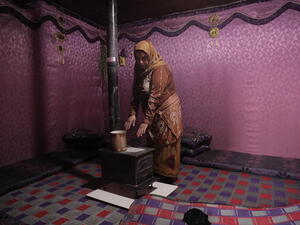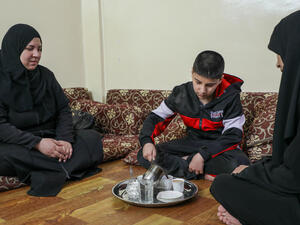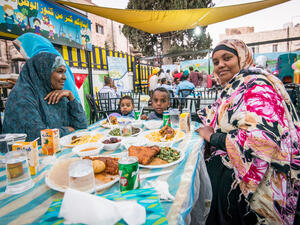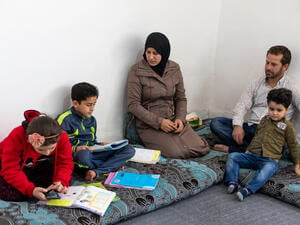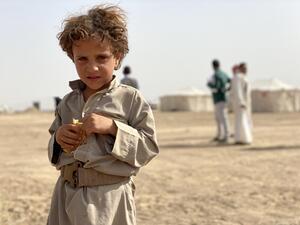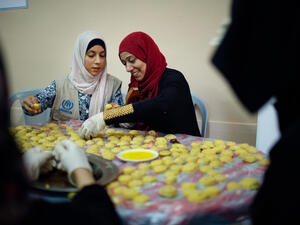Iraqis miss home and kin as Muslim world celebrates the start of Ramadan
Iraqis miss home and kin as Muslim world celebrates the start of Ramadan

A food distribution in Syria ahead of the start of Ramadan. Iraqi refugees will think of better times during the annual month of fasting.
CAIRO, Egypt, September 13 (UNHCR) - As the Muslim world prepared to celebrate the annual fasting period of Ramadan on Thursday, hundreds of thousands of Iraqi refugees from Cairo to Damascus reflected on a happier past and worried about relatives left behind in places like Baghdad.
"We are not going to feel the festivities or be able to celebrate when we know that the families that we left behind in Iraq are in daily danger," said 27-year-old Bassem,* who arrived in Cairo a few months ago with his sister. His parents and other siblings remain in Iraq.
His sorrow was felt by others around the region such as Ahmed, who fled to the Lebanese capital, Beirut, nine months ago. "Exile is a daily suffering and Ramadan comes to make you feel this even more," he said. "Now that Ramadan is here, I think of my parents and my siblings and how they all might be together now having iftar [breaking of the daily fast at sundown]."
During Ramadan, one billion Muslims around the world observe a month of prayer and repentance. For followers of Islam, it means a period of mental and physical purification during which they do not consume any food or drink between sunrise and sunset.
But once the sun has gone down, Muslims traditionally enjoy a series of meals ranging from iftar to sahur, the last meal before dawn. In many ways, the succession of Ramadan meals has the air of a feast held in phases throughout the hours of darkness, every night for a month.
It is a sharing experience and a time to relax - but not for many of the Iraqis in cities like Amman, Beirut, Cairo and Damascus, which between them are hosting more than 2 million Iraqi refugees from the chaos and conflict that has enveloped their homeland. Instead, they feel the pressure and distress of living as refugees in a foreign country. Many refugees are also trapped in poverty after running out of the savings that they brought with them from Iraq.
Ali, who arrived in Jordan a month ago, is among those who have nothing to look forward to this year at Ramadan. "I have no job, a wife and an unborn child that are depending on me to provide them with money," said Ali*, who left his pregnant spouse behind in Baghdad. "I will spend Ramadan in Amman with friends but without my family, without the people or the food that I love."
Despite the despair and economic hardship, Iraqis are grateful that they have safety and security in their host communities. Many recall the terrible sectarian violence that triggered their flight from Iraq.
"There is more security here," said Iraqi refugee Mona* in Amman. "At least you have electricity. In Iraq, we were using candles and at some point no one came to break the fast with us and my brothers who lived in different neighbourhoods in Baghdad could not come anymore. It was too dangerous," she added. Mona's three children remain in Baghdad.
In Syria, refugees will celebrate the holy month in peace. "Even though all my family is here with me in Syria, I miss home - especially in these days of Ramadan," said 32-year-old Hussein in Damascus. "But at least we live safely here and can eat in peace. Perhaps, one day, we will be able to return to Iraq and enjoy Ramadan and festivities with our families."
Across the region, UNHCR is assisting hundreds of thousands of Iraqis. From today, UNHCR and the Syrian Arab Red Crescent will distribute 9,000 hot meals every night to refugees in Damascus and its suburbs - that will come to more than 270,000 meals during the fasting month.
Food supplies have also been sent by convoy from Damascus to the Iraqi border camp of Al Tanf camp, where 350 Palestinian refugees from Baghdad have been stuck since last year. In Beirut, meanwhile, UNHCR will be organizing a weekly breakfast for refugees from all sects and religions - including Iraqis - at a community centre in the southern suburbs of Beirut.
More than 4 million people have been uprooted from their homes in Iraq. The UN refugee agency estimates that more than 2 million have taken refuge in neighbouring states with another 2.2 million displaced inside Iraq.
* Names changed for protection reasons
By Abeer Etefa in Cairo, Egypt
with Laure Chedrawi in Beirut, Lebanon
Rana Sweis in Amman, Jordan
and Sybella Wilkes in Damascus, Syria

